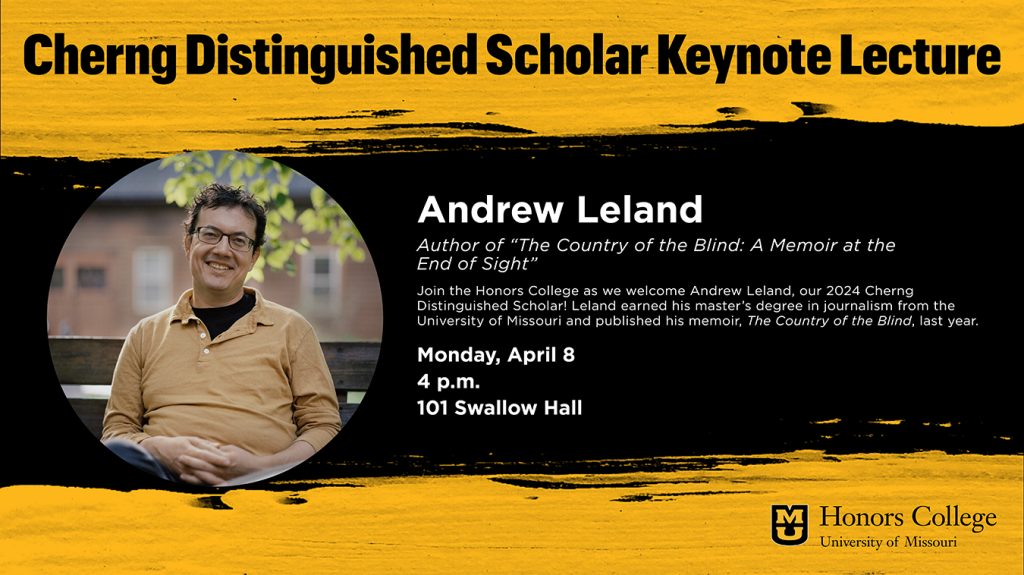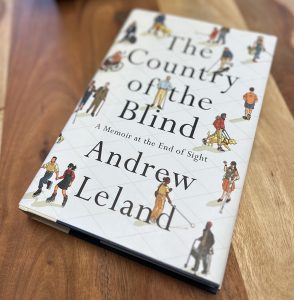Published on March 12, 2024

Since high school, Andrew Leland has had to grapple with his worsening vision due to retinitis pigmentosa, a rare and progressive eye disease that leads to the deterioration of the retinas. Nearly a decade ago, Leland began using a cane full-time – a decision that brought frustrations but also a desire to explore new questions and experiences.
Leland’s journey eventually became a memoir, The Country of the Blind: A Memoir at the End of Sight, which was published last year.
“I’ve known I was slowly losing my vision for many years,” said Leland, who is a writer, audio producer and editor. “About eight years ago, I decided to start using a white cane full-time whenever I left the house, and this decision had a transformative impact – everyone from close family to total strangers seemed to see me, and treat me, differently. This shift was difficult, and upsetting, but also fascinating, and raised a whole host of questions that I felt a suddenly urgent need to explore. What began as a series of short talks and essays soon snowballed into a full-blown book project.”
Leland will share more about his experiences with University of Missouri faculty, staff and students after being named this year’s Cherng Distinguished Scholar. Each year, the MU Honors College welcomes a leading scholar to campus to interact with a variety of audiences through lectures, seminars and classroom visits as part of the Cherng Distinguished Scholar and Visiting Faculty program.

Leland’s public keynote lecture will be at 4 p.m. on Monday, April 8, in 101 Swallow Hall. The event is free and open to all.
“We are very excited to welcome Andrew to campus to share his incredible story,” said Catherine Rymph, dean of the Honors College. “His memoir touches on several important areas – modes of reading, disability history, political culture, education, race, art, parenting, neuroscience, engineering and technology. Andrew is a terrific writer and an astute observer; every topic he addresses emerges as more complicated than originally anticipated.”
Mizzou played an important role in Leland’s journey. He served as an adjunct professor in both the MU School of Journalism (magazine) and the College of Arts and Science (digital storytelling) as he not only finished his bachelor’s degree but also received a master’s degree in journalism, which he officially earned in 2018.
“I was floored when I found out I’d be this year’s Cherng Distinguished Scholar,” Leland said. “The five years I spent at Mizzou were pivotal for my thinking in so many ways: MU is where I finished my long-deferred bachelor’s degree (and then received my master’s); it’s where I became an audio producer and teacher; reading and talking and thinking alongside so many brilliant scholars and students, discussing questions around media, narrative, history, politics and criticism, forever shaped the way I approach my work as a writer.”
Leland’s writing has appeared in a variety of spots, including the New York Times Magazine, the New York Review Daily, McSweeney’s Quarterly, the San Francisco Chronicle and BOMB Magazine. He’s produced audio for numerous entities, and hosted and produced an arts-and-culture podcast, “The Organist,” from 2013-19 for KCRW, a radio station that serves the greater Los Angeles area and other communities in southern California.
Along with teaching at Mizzou, Leland has taught at Smith College (Northampton, Massachusetts) and the University of Massachusetts-Amherst. He has been an editor at the Believer since 2003 and has served as a book editor for McSweeney’s and Chronicle Books.
The Country of the Blind documents Leland’s journey as he prepares for blindness. He confronts a variety of questions throughout the memoir as he discusses his fears, how blindness affects his relationships and what it’s like living in a world that doesn’t understand blindness.
“Blindness is a profoundly stigmatized and misunderstood experience,” Leland said. “Most people have a received notion that being blind is a tragedy, full-stop, and that any sense that one might live a normal – let alone a happy, interesting, productive – life as a blind person is delusionally wishful thinking. My hope is to make an argument for why everyone should not just care about disability as another ‘cause’ to feel sympathy (or, in the worst case, pity) for, but rather as another facet of human life that opens windows onto fascinating and fertile intellectual and experiential domains.”